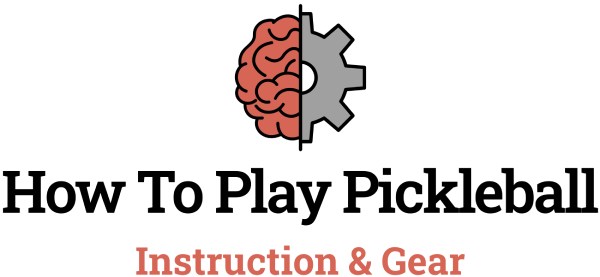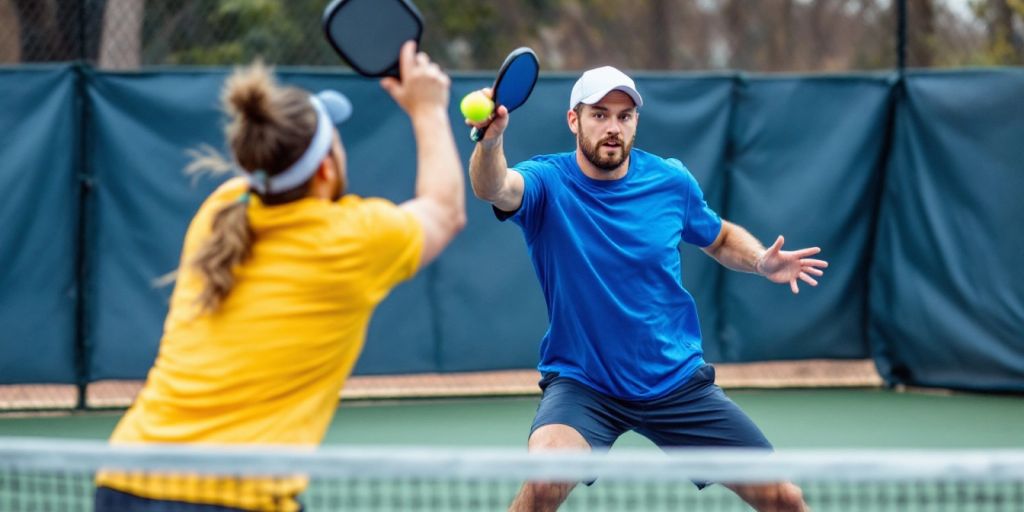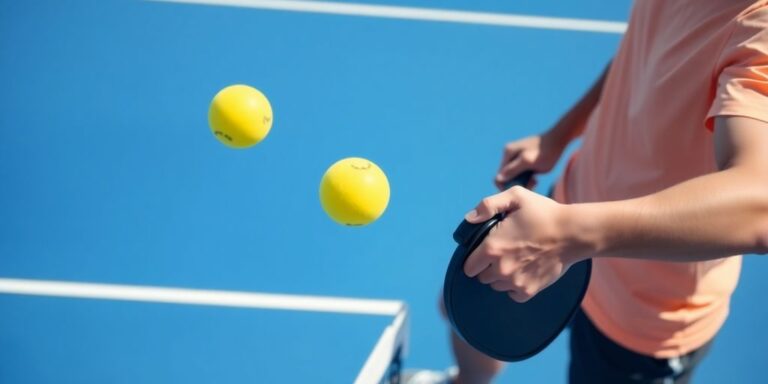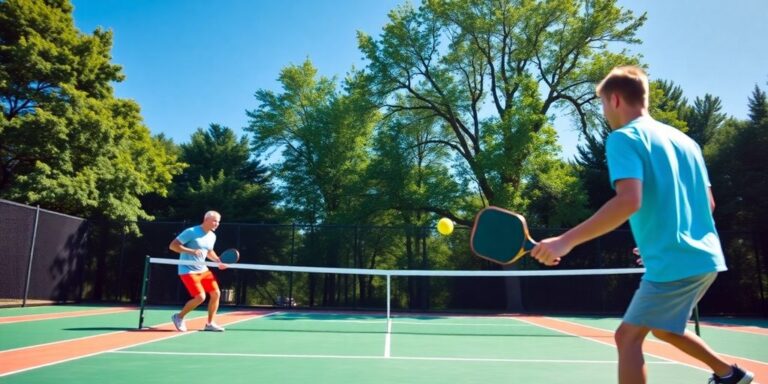In the fast-paced world of pickleball doubles, having a solid strategy can make a huge difference in your performance. This article will explore key strategies that can help you and your partner improve your game and work better as a team. By mastering techniques and understanding your roles on the court, you can elevate your pickleball strategy for doubles and increase your chances of winning.
Key Takeaways
- Focus on serving deep to keep opponents on the defensive.
- Control the non-volley zone for a stronger offensive position.
- Communicate clearly with your partner during the game.
- Practice advanced shots like drop shots and cross-court dinks.
- Adapt your strategies based on your opponents’ weaknesses.
Mastering the Serve and Return
Effective Serve Techniques
To gain an advantage in pickleball doubles, serving deep is essential. A deep serve forces your opponents to stay back near their baseline, making it harder for them to return the ball effectively. Here are some key points to remember:
- Aim for the baseline to limit your opponent’s options.
- Practice serving consistently to improve accuracy.
- Use different types of serves to keep your opponents guessing.
Strategic Return Placement
When returning a serve, targeting the middle of the court can create confusion for your opponents. This strategy often leads to both players hesitating, unsure of who should take the shot. Here are some tips for effective returns:
- Aim for your opponent’s backhand, which is usually weaker.
- Return the serve deep to push your opponents back.
- Avoid standing too close to the baseline to give yourself more time to react.
Avoiding Return Faults
Consistency is key in pickleball. To avoid return faults, focus on:
- Keeping your shots simple and well-placed.
- Practicing your foot positioning to ensure you’re ready to return effectively.
- Remembering the two-bounce rule, which requires you to let the ball bounce before returning it.
Mastering the serve and return is crucial for setting up your game. By focusing on these strategies, you can create opportunities for your team and put pressure on your opponents.
Controlling the Non-Volley Zone
Importance of the Kitchen
The non-volley zone, often called the kitchen, is a crucial area in pickleball doubles. Controlling this zone can significantly impact your game. When both players position themselves at the kitchen line, they can better defend against opponents’ shots and create offensive opportunities. Here are some key points to remember:
- Move to the kitchen line quickly after serving and returning.
- Use soft shots like dinks to keep the ball low.
- Aim for your opponents’ feet or their weaker side to limit their options.
Positioning for Control
Proper positioning is essential for dominating the non-volley zone. Here are some strategies:
- Stay close to the net: This allows you to react quickly to incoming shots.
- Communicate with your partner: Use clear signals to indicate who will take the shot.
- Anticipate your opponents’ moves: Being aware of their positioning can help you make better decisions.
Offensive and Defensive Plays
In the non-volley zone, both offensive and defensive plays are vital. Here’s how to balance them:
- Offensive plays: Look for opportunities to poach or attack when your opponents are out of position.
- Defensive plays: If your opponents are aggressive, focus on keeping the ball low and returning it to their feet.
Mastering the non-volley zone is about patience and strategy. By controlling this area, you can dictate the pace of the game and increase your chances of winning.
Communication and Teamwork
Building Strong Partnerships
In pickleball doubles, strong partnerships are key to success. To build a solid team, consider the following:
- Discuss strengths and weaknesses: Talk about what each player does best and where they might need help.
- Create a game plan: Develop strategies that play to both players’ strengths.
- Celebrate successes: Acknowledge good plays to boost team morale.
On-Court Communication Tips
Effective communication is essential for success. Use short, decisive words like "mine" or "yours" to claim shots, and make sure both partners understand when to take action. Here are some tips:
- Use hand signals: Develop a system of signals to indicate plays without shouting.
- Stay positive: Encourage each other, especially after mistakes.
- Practice together: Regular practice helps improve understanding and timing.
Adapting Strategies Together
Being flexible and adjusting strategies during the game is crucial. Here’s how to adapt:
- Evaluate opponents: Pay attention to how your opponents play and adjust your tactics accordingly.
- Communicate changes: If a strategy isn’t working, discuss new ideas quickly.
- Support each other: Always be ready to back up your partner’s decisions.
Remember, effective communication and teamwork can make all the difference in winning matches. By working together and supporting each other, you can outsmart your opponents and dominate the court!
Advanced Shot Techniques
Utilizing Drop Shots
Drop shots are a crucial part of your pickleball strategy. Mastering the drop shot can catch your opponents off guard. Here are some tips to effectively use drop shots:
- Aim for the non-volley zone (NVZ) to make it hard for your opponents to attack.
- Use a soft touch to ensure the ball drops just over the net.
- Practice your timing to hit the drop shot at the right moment.
Cross-Court Dinks
Dinking is a soft shot that lands in the opponent’s NVZ. It’s a great way to control the game. Here’s how to excel at cross-court dinks:
- Keep the ball low to avoid giving your opponents an easy shot.
- Focus on placement to force your opponents to move.
- Use dinks to set up for a more aggressive shot later.
Targeting Opponents’ Weaknesses
Identifying and exploiting your opponents’ weaknesses can turn the game in your favor. Here’s how:
- Observe your opponents’ shots to find their weaker side.
- Aim your shots to force them into uncomfortable positions.
- Communicate with your partner to coordinate attacks on their weaknesses.
Mastering these advanced shot techniques can significantly improve your game. Focus on practicing these skills to enhance your performance on the court.
Movement and Positioning

Moving in Sync with Your Partner
To win in doubles pickleball, moving together is crucial. Imagine you and your partner are tied together with an invisible rope. When one of you moves, the other should follow. This helps to cover the court better and prevents gaps that opponents can exploit. Here are some tips to practice:
- Always keep a distance of about 8 to 10 feet from your partner.
- If your partner moves left, you should move left too.
- Practice mirroring each other’s movements during drills.
Covering the Court Effectively
Effective court coverage is key to winning points. Here are some strategies:
- Positioning: Stand close enough to support each other but not so close that you get in each other’s way.
- Anticipation: Watch your opponents closely to predict their shots and adjust your position accordingly.
- Switching: Use strategies like switching positions to confuse your opponents and create better matchups.
Adjusting to Opponents’ Play
Being flexible is important in doubles. Here’s how to adapt:
- Read the game: Pay attention to your opponents’ strengths and weaknesses.
- Communicate: Use clear signals like "mine" or "yours" to avoid confusion.
- Practice patience: Wait for the right moment to strike instead of rushing your shots.
Remember, teamwork is essential. The more you practice moving as one, the better your chances of winning will be. Mastering movement and positioning can lead to more victories on the court!
Analyzing and Adjusting Strategies
Evaluating Game Performance
To improve your game, it’s crucial to evaluate your performance after each match. Here are some steps to follow:
- Review your shots: Identify which shots worked and which didn’t.
- Discuss with your partner: Talk about what strategies were effective.
- Watch for patterns: Notice if your opponents have weaknesses you can exploit.
Adapting to Opponents’ Style
Every opponent plays differently, so adjusting your strategy is key. Consider these points:
- Observe their strengths and weaknesses: Pay attention to their favorite shots.
- Change your positioning: If they hit cross-court shots often, adjust your court coverage.
- Switch up your shots: Use a mix of soft and hard shots to keep them guessing.
Continuous Improvement
Improvement is a never-ending process. Here are some tips to keep advancing your game:
- Practice regularly: Consistent practice helps reinforce strategies.
- Stay open to feedback: Listen to your partner’s suggestions.
- Experiment with new tactics: Don’t be afraid to try different strategies during practice.
Remember, teamwork and communication are essential in pickleball. By analyzing your game and adjusting your strategies, you can become a stronger team and increase your chances of winning.
Mental Game and Patience

Staying Focused Under Pressure
In pickleball doubles, mental strength is just as important as physical skills. Staying focused during the game can help you make better decisions. Here are some tips to improve your focus:
- Take deep breaths before serving to calm your nerves.
- Visualize a successful shot to boost your confidence.
- Use positive self-talk to keep your spirits high.
Practicing Patience in Play
Being patient is key in pickleball. It’s easy to rush, but taking your time can lead to better shots. Here’s how to practice patience:
- Recognize moments when you could have waited longer before hitting the ball.
- Discuss these moments with your partner after the game.
- Work together to improve your timing and shot selection.
Building Confidence as a Team
Confidence comes from practice and teamwork. Here are some ways to build it:
- Celebrate small victories during the game.
- Encourage each other, especially after mistakes.
- Set goals together to improve your overall game.
Remember, the mental game is a journey. Improving your patience and focus will take time, but it’s worth it for your success on the court!
Mastering the mental side of pickleball is just as important as perfecting your shots. Patience is key; it helps you stay calm and focused during tough matches. Want to improve your game? Visit Nunnery’s Pickleball Lab for expert tips and live Q&As that can take your skills to the next level!
Conclusion
Winning at pickleball doubles is all about teamwork and smart strategies. By focusing on communication and positioning, you can really boost your chances of success on the court. Remember, it’s not just about hitting the ball hard; it’s about playing smart and working together with your partner. Try out the tips we discussed, practice regularly, and keep adjusting your game plan as needed. With dedication and the right strategies, you and your partner can become a strong team that stands out in every match. So get out there, have fun, and enjoy the game!
Frequently Asked Questions
What are the best serving techniques in pickleball doubles?
To serve well in pickleball doubles, aim for deep shots that land near the baseline. This forces your opponents to move back and makes it harder for them to respond quickly.
How should we return serves effectively?
When returning a serve, aim for the middle of the court. This confuses the opponents because they won’t know who should take the ball, and it often targets their weaker backhand.
Why is the non-volley zone important?
The non-volley zone, or ‘kitchen’, is crucial because controlling it allows your team to play more aggressively and limits the opponents’ ability to hit hard shots.
What are some tips for better communication with my partner?
Use simple calls like ‘mine’ or ‘yours’ to indicate who will take the ball. Practicing these cues during games can help build trust and improve teamwork.
How can we improve our movement on the court?
Work on moving together with your partner. Always be aware of each other’s positions and adjust to cover the court effectively.
What should we do if a strategy isn’t working during a match?
If a strategy isn’t working, discuss it with your partner and be open to changing your approach. Adapting to the opponents’ style can help improve your game.




